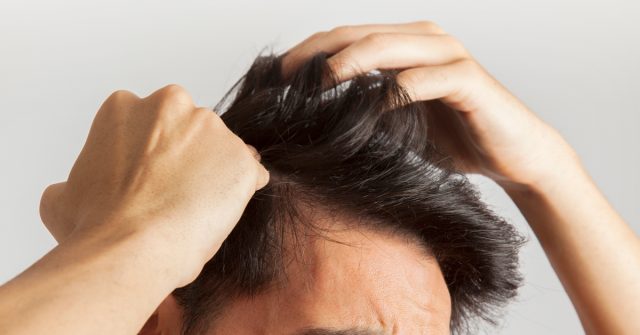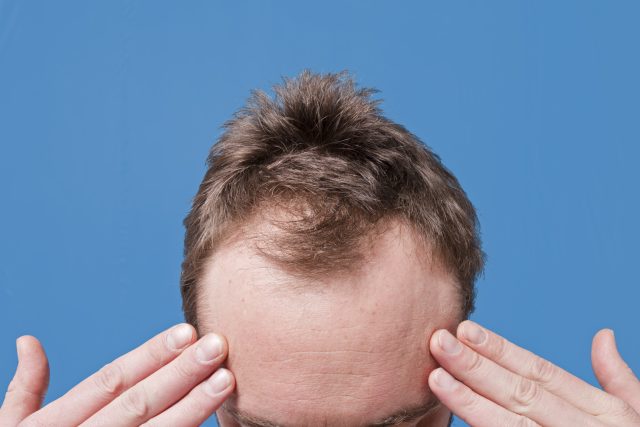All of us shed hair daily, and it is a natural renewal process. According to the American Academy of Dermatologists, losing from 50 to 100 strands of hair per day is considered normal. Yet, when the amount of hair shed is greater than that of being grown, you may find your hair density slowly declines and hair loss is the result.
Causes of hair loss in males
While we are not entirely sure about the underlying causes of hair thinning in male, we do know that it has something to do with a hormone called dihydrotestosterone (DHT), a byproduct of the famous male sex hormone testosterone (T). So, how is DHT produced? What is the problem with too much DHT? DHT is formed from testosterone with the help of an enzyme called 5α-reductase. A high level of 5α-reductase , or the enzyme being overly proliferative, may result in excessive production of DHT. DHT binds to hair follicles, and blocks the supply of nutrients to the hair root. This starves the hair and eventually causes them to shrink and fall out. Therefore, overproduction of DHT has long since been linked to baldness in men and is most likely hereditary. This means if you have family members who suffer from male-pattern baldness, chances are that you will also experience hair loss at a time point similar to theirs.Other causes of hair loss in men
Although hair loss in males is primarily genetic, other factors may also play a role in hair loss.Medical conditions that causes hair loss
- Alopecia areata, or spot baldness: It is a condition that causes your body’s immune system to attack your hair follicles, resulting in hair falling out in small patches from your head. Other parts of the body can be affected, such as your beard, eyelashes, or eyebrows.
- Thyroid dysfunction: The thyroid gland is involved in regulating our hormonal processes, including those related to hair growth. An underactive or overactive thyroid could result in hair loss.
Medications that can cause hair loss
A variety of medications may cause hair loss as a side effect. Most of them are only temporary, and your hair growth will likely resume once you stop taking the medicines. Examples include:- Anticoagulants (blood thinners)
- Antihypertensives such as ACE inhibitors and beta blockers
- Chemotherapy
- Immunotherapy
- cholesterol-lowering drugs such as simvastatin (Zocor) and atorvastatin (Lipitor)
- antidepressants such as sertraline (Zoloft) and fluoxetine (Prozac)
Nutritional deficiency and hair loss
- Iron: Although the exact mechanism is unclear, scientists believe that it has something to do with the role of iron in making DNA. The hair follicles are some of the most rapidly-dividing cells in the body. Iron is a cofactor of a rate-limiting enzyme for DNA production.
- Zinc: This mineral is essential for many body processes, such as hair growth and repair. It also helps the oil glands around the hair follicles to work properly. A study conducted in South Korea found that patients diagnosed with alopecia areata (AA), male pattern hair loss, female pattern hair loss and telogen effluvium had a significantly lower zinc concentration than healthy individuals. Some researches also suggested that oral zinc supplementation helps treat deficiency-related hair loss.
- Vitamins: A variety of vitamins are vital for hair growth. For instance, biotin, a type of B-vitamin, is closely linked to the hair growth.
- Protein: Your hair is made up of protein. When your body doesn’t have enough protein, it will force your hair into a resting state to conserve your protein storage. You may not notice any signs of hair loss after cutting protein for just a few days. But if you continue to do so for a few months, you may find your hair shedding increases.
Other factors
- Stress: Physical shock or psychological stress can trigger hair shedding, known as telogen effluvium. It typically occurs 2 to 3 months after some shock to the body, such as illness, sudden weight loss, surgery, traumatic events, and mental stress. This type of hair loss is temporary and usually occurs at the top of the scalp.
Summary
If your hair loss problem concerns you, talk with a healthcare professional. Professionals can determine if your hair loss is caused by the typical male pattern baldness or other reasons such as medical conditions, side effects of your current medications, and nutritional deficiency. Your doctor can also offer you advice on lifestyle changes as well as the best treatment available for your hair loss. Some of the most common treatment options are hair loss medications, such as topical minoxidil and oral finasteride. Other treatment options include laser therapy and hair transplant surgery. If you want to know more about the treatment options for hair loss, have a look at this article or book a consultation with us to find out more.
Dr Afraz Adam
Chief Medical Officer
MBBS. FRNZCUC





